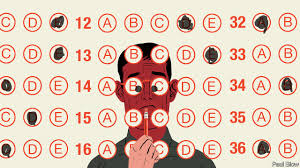Questions in such tests may ask a candidate to describe their behaviour in hypothetical situations: dealing with an angry customer, for example. The suggested answers may all be plausible (apologise profusely, fetch a manager and so on), so there is no obviously “right” answer. Nevertheless the aim is to build a profile of the candidate to see if they have the right character traits for the job.
這些測試中的問題可能會要求應(yīng)試者描述他們在一些假設(shè)情況下的行為,例如與憤怒的客戶打交道。測試中所推薦的答案可能都合乎情理(不斷道歉、找經(jīng)理解決等等)。所以這些問題顯然沒有“正確”答案。然而,進(jìn)行測試的目的是建立應(yīng)試者的個人資料,查看這些求職者的性格特征是否符合這份工作。
People are generally judged on the basis of five characteristics with the acronym OCEAN for openness, conscientiousness, extroversion (or introversion), agreeableness and neuroticism. The ideal characteristics can be surprising: it turns out that introverts are the best traindrivers as they seem to pay more attention to details such as safety procedures and can cope with spending long periods of their time on their own.
公司通常會根據(jù)五項特征對求職者進(jìn)行判斷,即開放性、勤勉謹(jǐn)慎性、外向性(或內(nèi)向性)、親和性、以及情緒不穩(wěn)定性,這五種特質(zhì)可縮寫為“大海(OCEAN)”。一些職業(yè)所對應(yīng)的最適合的性格特征可能會使你大跌眼鏡。事實(shí)證明,內(nèi)向的人可以成為最好的火車司機(jī),因為他們似乎更注重安全程序等細(xì)節(jié),而且能夠從容獨(dú)處很長一段時間。

Extroverts do not make the best callcentre employees because they can spend so much time chatting to customers that they don’t get much done. The most useful trait among such workers, according to Steve Fletcher, an occupational psychologist, is assertiveness; this enables them to deal with more calls.
外向的人并不是最合適的呼叫中心員工,因為他們會花費(fèi)很長時間與客戶聊天,也就沒有完成很多工作。職業(yè)心理學(xué)家史蒂夫·弗萊徹認(rèn)為,自信才是這類員工最實(shí)用的特質(zhì)。自信的呼叫中心員工有能力處理更多的來電。
These tests are used to assess senior managers, as well as new hires. Along with OCEAN characteristics, testers are also looking for what is known as the “dark triad”—psychopathy, narcissism and Machiavellianism. Factors that can make people successful as junior managers may limit their ascent. Candidates who are good with detail turn out to be obsessive micromanagers; people who flourish in sales may have an excessive need to be the centre of attention.
公司會應(yīng)用這些測試評估高管和新員工。測試人員不只會注意你的“大海”特征,還會挖掘所謂的“暗黑人格”,即精神病態(tài)、自戀、和馬基雅維利主義。讓初級管理者收獲成功的因素可能會同樣阻礙他們的升職。事實(shí)證明,長于細(xì)節(jié)的應(yīng)聘者往往是擁有強(qiáng)迫癥的微觀管理者;擅長銷售的應(yīng)聘者則很可能有著出風(fēng)頭的過度需求。
A large majority of big companies use these tests but they are hardly perfect. Paul Flowers, the former head of Co-op Bank, a British lender, passed his psychometric tests with flying colours, according to testimony at a parliamentary inquiry. But he was later ousted in a sex-and-drugs scandal that led him to be dubbed “the crystal Methodist”. Mr Johnson says the tests can be useful, but only in conjunction with aptitude tests and structured interviews.
多數(shù)大型公司都會使用這些測試,但它們并不完美。保羅·弗勞爾斯是英國一家合作貸款銀行的前行長。根據(jù)議會調(diào)查的證詞,保羅通過了心理計量測試,而且測試成績斐然。但他后來因性丑聞和毒品丑聞被趕下臺,因而被戲稱為“水晶湖公理會教徒”。約翰遜表示,這些測試可能有用,但只能與能力傾向測試和結(jié)構(gòu)化面試結(jié)合起來。
That probably won’t save job candidates from having to take these tests in future, because they winnow down the list. But at least they beat the old-fashioned method: drop half the applications in the bin and pick from the other half.
這可能并不會阻礙求職者將來繼續(xù)參加這些測試,因為公司能夠以此對求職者名單進(jìn)行篩選。但至少心理測試戰(zhàn)勝了傳統(tǒng)的篩選方法,即把一半申請書扔進(jìn)垃圾桶,再從另一半中進(jìn)行選拔。
譯文由可可原創(chuàng),僅供學(xué)習(xí)交流使用,未經(jīng)許可請勿轉(zhuǎn)載。











